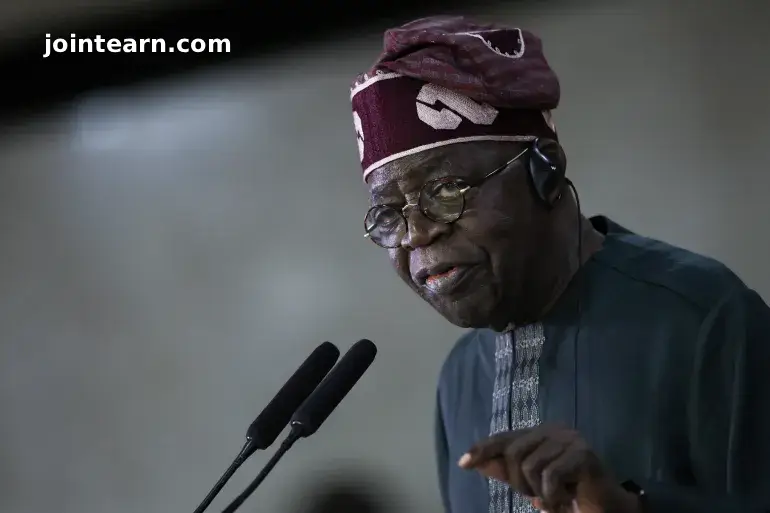
Nigeria’s President Bola Ahmed Tinubu has announced a sweeping reorganization of the nation’s security leadership, replacing several top military chiefs just days after the army dismissed persistent rumours of a coup plot. The move underscores the administration’s struggle to address rising insecurity across the country and reassert control amid growing unease within the armed forces.
Tinubu: “Strengthening Nigeria’s National Security Architecture”
In a brief statement released on Friday, President Tinubu said he had “approved changes in the hierarchy of our armed forces to further strengthen Nigeria’s national security architecture.”
According to presidential spokesperson Sunday Dare, Tinubu dismissed three service chiefs—General Christopher Musa (Chief of Defence Staff), Vice Admiral Emmanuel Ogalla (Chief of Naval Staff), and Air Marshal Hassan Abubakar (Chief of Air Staff).
In their place, the president appointed:
- General Olufemi Oluyede, former Chief of Army Staff, as the new Chief of Defence Staff.
- Shaibu, I. Abbas, and S.K. Aneke as the new Chiefs of Army, Air Force, and Naval Staff respectively.
Tinubu tasked the new military leaders with promoting “professionalism, vigilance, and comradeship” within the Armed Forces of Nigeria, urging them to restore public trust and operational efficiency.
Coup Plot Denied, But Suspicion Persists
The shake-up follows local media reports that more than a dozen senior military officers—including a brigadier general and a colonel—were arrested in September over alleged links to a coup plot.
While the Nigerian army publicly denied any coup attempt, some analysts argue that the leadership overhaul may have been motivated by internal tensions within the military.
“Leadership reshuffles are normal in Nigeria,” said Confidence MacHarry, a security expert with Lagos-based consultancy SBM Intelligence. “But this one may be aimed at taking the wind out of the sails of coup plotters or punishing top officers for poor security performance.”
The development comes amid a resurgence of violent activity by Boko Haram, ISIL (ISIS), and heavily armed bandit groups across the northern and central regions.
Rising Insecurity and Protests in Abuja
The capital, Abuja, witnessed protests earlier this week as police clashed with demonstrators demanding the release of Nnamdi Kanu, leader of the Indigenous People of Biafra (IPOB)—a separatist movement seeking independence for Nigeria’s southeast.
Security forces fired tear gas and made several arrests, underscoring the government’s sensitivity to internal dissent. Analysts believe these tensions have increased Tinubu’s urgency to tighten control over the security apparatus.
“In the current climate, the administration may be prioritizing regime protection over broader security reforms,” said Senator Iroegbu, an Abuja-based analyst, in comments to the Associated Press.
North Under Siege: Boko Haram and Banditry Resurge
In the northeast, Boko Haram and its splinter factions have regained momentum, overrunning outposts, planting roadside bombs, and raiding rural communities.
The insurgency, which began in 2009, has killed tens of thousands and displaced millions. The Nigerian army has struggled to contain the threat despite foreign military assistance and a decade of counterinsurgency campaigns.
Simultaneously, bandit gangs in the northwest continue to conduct mass kidnappings, targeting schoolchildren, travelers, and farmers. These armed groups are heavily armed and often operate beyond state control, collecting ransoms and raiding villages.
In recent months, analysts have warned of Nigeria’s increasing vulnerability to a full-blown security crisis reminiscent of the early 2010s, when large swaths of territory were under militant control.
U.S. Military Support and Regional Coup Fears
Earlier this year, the United States approved a $346 million arms deal to bolster Nigeria’s counterinsurgency capabilities. The package includes attack helicopters, surveillance drones, and advanced weapons systems aimed at supporting the fight against terrorism and organized crime.
Yet, concerns persist that the wave of military coups across West Africa—in Mali, Burkina Faso, and Niger—could embolden discontented factions within Nigeria’s own armed forces.
Nigeria, the continent’s largest democracy, has not experienced a coup since 1993, but analysts say political instability, economic hardship, and public frustration could create the right conditions for unrest.
“The trend in the Sahel is worrying,” noted MacHarry. “If the security and economic situation continues to deteriorate, Nigeria cannot assume it is immune.”
Tinubu’s Balancing Act: Reform or Retrenchment?
President Tinubu, who took office in 2023, faces mounting criticism over his handling of national security, the economy, and widespread public protests over inflation and unemployment.
His administration insists that the military reshuffle is part of a broader effort to modernize Nigeria’s defence institutions, not a reaction to internal dissent.
However, observers warn that the shake-up could have dual motives — to reassert control over potentially restive officers while signaling to international partners that the government remains stable and proactive.
“Tinubu is walking a tightrope,” said Iroegbu. “He needs to project confidence to citizens and allies while preventing any perception of weakness within the military.”
Conclusion: Stability or Suppression?
As Nigeria continues to battle terrorism, separatism, and economic discontent, the latest shake-up underscores the fragility of its political and security landscape.
While the presidency frames the changes as an effort to strengthen national defence, critics fear it may mark a turn toward militarized governance and regime protection, rather than genuine reform.
The coming months will test whether Tinubu’s new military leadership can restore order—or whether Nigeria risks following its neighbours down the path of military intervention and political upheaval.


Leave a Reply